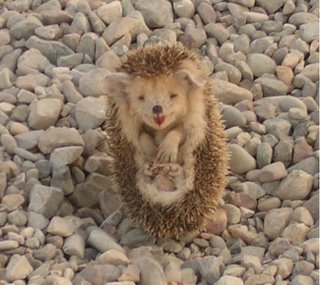
 ( those in photo from left to right: ME , Tamara Kachelmeier, Brandon Helm, Gary Hoover, Ken Avidor, Ben Portwood and Don Portwood)
( those in photo from left to right: ME , Tamara Kachelmeier, Brandon Helm, Gary Hoover, Ken Avidor, Ben Portwood and Don Portwood)When I was on leave in Minnesota, I had a photo taken and a short interview pertaining my activism in the peak oil community. The Southwest Journal decided to publish the story now. Probably because prices have not gone below the pre-Katrina peak. I have my own perspective - seeing prices steadily rise as demand outpaces supply - then the peak will hit and the average Joe will have no choice but to conserve.
So one thing I do is assist in putting these red stickers on "STOP" signs in Minneapolis that encourage drivers to "STOP DRIVING." I am sure it surprises quite a few people - and the stickers only stay an average of 6-9 months. Then they change the signs ( because these stickesr are not easily removeable.)
One interesting thing about the article is that they included that I do not think that the Iraqi war is mainly about oil. I think the harm a rogue nation with immense wealth can do to the World is a global security issue. Obviously we want a stable Iraq to continue selling oil - but we want a stable Middle East as well. The only problem is that Iran is still in existence and Iraq/Afghanistan could fall apart at any point without our support.
Obviously I am not as concerned with the conspiracy theories as the reality that is before us now. And preparing for peak oil is a reality that must sink into the average American.
Here's the article:
By Michael Metzger
Southwest ‘Peak oil' activists have long insisted that Minneapolis plan for an age of scarce petroleum; amid recent price hikes, the rest of us might finally pay attention
At one time in America, it was indeed possible to unexpectedly strike it rich in oil. The stuff literally poured out of the ground in Pennsylvania - where the first oil strike occurred - and in Texas, Oklahoma, Louisiana and elsewhere. It seemed as if the supply would never end.
But in the 1950s, when gasoline sold for less than 50 cents a gallon, a Shell Oil geologist named M. King Hubbert was working on a theory that would undo forever the notion of infinite oil.
In 1956, Hubbert told a hostile audience at a meeting of the American Petroleum Institute that United States oil production would peak in 1970. Fourteen years later, he was proven to be right, as production of American oil hit a high in 1970 and began a slow descent that continues today. The bell curve that describes the ascent, peak and decline of oil production became known as “Hubbert's peak” - better known today as “peak oil.”
The concern these days isn't about American oil production - the oil industry long ago acknowledged that Hubbert was right about U.S. crude production - but whether Hubbert's peak theory can be applied to the planet as a whole.
In Southwest, peak oil-theory advocates meet every month at the vegan restaurant Ecopolitan, 2409 Lyndale Ave. S., to talk about the coming end of the age of oil. Each of these handful of people is convinced that oil production worldwide has peaked, or soon will, and that the planet is about to be thrust into a difficult post-peak era involving economic crises caused by dramatically higher oil prices, resulting in drastic changes to the American dream and way of life.
At one time, they might have been dismissed with a laugh as Chicken Littles with too much time on their hands. But many of their ideas are in the mainstream, as Americans pump $3 gasoline into post-chic SUVs and speculate about our government's motives for attacking and occupying oil-rich Iraq. Suddenly, it's not quite as funny or far-fetched to think of worldwide oil production peaking and declining.
Kevin Chavis of Whittier has a bigger stake than most in peak oil.
The 23-year-old was understandably reluctant to spend a lot of time discussing peak oil theory when he was contacted for this article. A sergeant in the Minnesota National Guard, he was headed back to his communications post north of Baghdad the next morning. But he took a few minutes away from the little time he had left to spend with his girlfriend to talk about the opportunities he says peak oil will present when it arrives.
“I see the opportunity to transition to a different way of life,” he said. “Simpler, more localized, probably more cooperation. That's the only way things are going to work out, is if everyone works together instead of competing for resources.”
He thinks peak oil hasn't arrived yet - it's still a decade or so away, he says - but that when it does hit, oil prices will rise beyond the reach of a lot of Americans.
“As prices slowly increase, our lives have to change. Some people will embrace an alternative.”
Like many peak oil advocates, Chavis welcomes the changes he sees coming.
“I stopped driving after I learned about peak oil. I'd already been using the bus and everything, just as a way of saving money. And I thought about it, I could not own a car and put the extra money toward my 401K or for savings and so forth. And at the same time, not increase my CO2 levels, and save gasoline for others for the future, instead of us,” he said. “I thought it's better to conserve [oil] and change my lifestyle while I can. And so I did.”
Pedaling a theory
Gary Hoover of Lynnhurst is a peak oil advocate you might have seen pedaling around Southwest on one of his colorful, peace-sign-decorated tricycles.
Hoover said that it's not easy to say if the world has achieved peak oil yet. “We will only know afterwards,” he said.
That's because to observe the peak of production, you have to be able to look back at when production reached a high, plateaued and then began its decline.
Said Hoover, “Peak oil is hard for many people to accept because it challenges the rather naïve assumption that is fitting for the robber barons of the 19th century. That is, the earth is an infinite source of free resources and is also an infinite sink for toxic waste.”
Peak oil is “going to change our urban landscape and change the way we live dramatically. I'm not sure people are ready to hear that yet.”
None of the Southwest peak oil advocates at the Ecopolitan is an expert in oil production, but they all spend inordinate amounts of time reading books on the subject, as well as scouring the many Web sites devoted to the topic for any new bits of information confirming their suspicions that the age of oil is coming to an end.
Robert Holt, professor emeritus of political science at the University of Minnesota, dismisses peak oil theory and refers derisively to Hubbert's peak as “Hubbert's pimple.”
“It's irrelevant,” the Kenwood resident said of the theory. “If we have an oil shortage, it's not going to be because we're running out of oil, it's going to be because of political turmoil in [the Middle East], where all the oil is.”
He said that it's true oil production will eventually peak and then decline (his estimate is that it will take place in 30 to 40 years), but by then we'll have developed economically viable alternatives such as biodiesel, nuclear power and better coal-burning technology to replace much of the oil used today.
Holt said that society has shifted from one crucial technology to another in the past and will do so again.
“There was a time when you made all of your iron out of charcoal and pretty soon and all the trees were gone, by golly, and people said you're going to run out of iron because you have no charcoal. And they figured out a way to make coal work,” he said.
Hallelujah chorus
Don Portwood, pastor of CARAG's Lyndale United Church of Christ, 810 W. 31st St., is a recent addition to the peak oil meet-ups. He recently delivered a sermon to his congregation on peak oil titled “$2.69 a gallon and rising. Hallelujah?”
“It's scary stuff. I was trying to make them [in the congregation] aware of it,” Portwood said. “Make them aware that they're probably not going to read about it in the newspaper or see it on TV.”
Portwood said he quoted Woody Allen in the sermon: “More than any other time in history, mankind faces a crossroads. One path leads to despair and utter hopelessness. The other to total extinction,” Allen said. “Let us pray we have the wisdom to choose correctly.”
“I said I didn't feel as bad as Woody Allen,” Portwood recalled with a laugh.
He said he talked about putting faith over fear. “Faith over fear means not hearing about peak oil issues and hearing that there may be an economic collapse and going, ‘Oh, hell, there's nothing I can do about that.' This is a time for us to trust God and then work on the issue rather than burying our heads in the sand.”
He said that right now, he's trying to help raise awareness of the issue “so that there will be a tipping point that will lead the government to start joining us in trying to find a solution rather than being part of the problem.”
He said he hasn't urged his congregation to take any specific steps to stave off peak oil, but he did urge them to look “at our unsustainable lifestyle.”
One person who doesn't need persuading by Portwood is his 26-year-old son, Ben Portwood. Ben is moving to Switzerland later this year to be with his Swiss girlfriend and to get out of a country he sees heading toward economic collapse as post-peak oil becomes economically unviable.
“If there's anywhere you want to be when peak oil happens, it's not going to be in any city or any suburb or even in the United States of America,” he said.
“It seems like it's not going to be a pretty place to be. I'd rather be in a society where everyone gets along a little better and where the land is potentially able to support the population.”
Said Hoover, “Peak oil will either be a blessing or a curse. We are either going to grow up and look at this as an opportunity to learn how we really relate to the Earth, or we're going to decide that we're entitled to continue this pretense that we can just draw what we want and dump what we want. If we decide to continue the pretense, we're going to become more violent. It's going to require more violence [abroad] and at home to keep people in line.”
He said he thinks the invasion and occupation of Iraq is part of an increasingly bloody picture of the present and future.
“I think oil is the primary reason for us being in Iraq. Oil is the prize.”
According to the Department of Energy, the United States gulps about 21 million barrels of oil a day. Of this, 58 percent is imported. Proven oil reserves in this country have dropped 17 percent since 1990, so our imports figure to grow faster in coming years.
Chavis, who joined the Minnesota National Guard back in 2000, isn't sure that the United States invaded Iraq mainly to secure a supply of oil.
“I think that if anything were to happen in the Middle East, though, we are in Iraq and we can actively pursue any interests in the Middle East through our bases in Iraq. It's more of a long-term thing than a short-term thing.”
The future
Like Chavis, Cindy Gray of Kenwood sees the coming of peak oil as an opportunity to create a society in which people are more cooperative and less competitive than they are today.
Still, she's hedging her bets. She doesn't envision an immediate future filled with smiling, helpful neighbors bartering vegetables and solar power over their back fences. Things might well get ugly, she said, if our oil-fueled economy takes a serious turn for the worse.
“I sold my townhome last summer because of my feelings about what I think is going to happen. I don't want to be tied down to a mortgage; I might need to be mobile.”
She said she is tempted to move from Southwest to a planned post-peak sustainable community in Wisconsin, but because she enjoys her life here, she wants to help create a sense of community in the city.
“If I am going to stay here, I need to start looking at what I can do in my community for sure.”
She said she wants to get involved in the formation of an outpost, as described on www.postcarbon.org. There, feel-good plans are laid out for outposts in metropolitan areas where people bring “together a range of skills, ideas and resources,” “a focus for debate and the opportunity to consult with the wider community” and provide “the opportunity for local authorities and other organizations to involve and engage the views of local people.”
Hoover, who bikes or rides buses nearly everywhere he goes, wonders where he and his two kids and wife should be when peak oil hits.
“There is not going to be any place is safe or any place that is superior as peak oil progresses,” he said.
It'll be hard for people who move to rural areas to recreate the amenities of urban life such as medical facilities. And it will difficult for people in the city to grow enough food on their small plots of land to become a sustainable community.
“The Minneapolis I envision is one where we basically have an edible landscape where we have gardens in every yard and on every boulevard. We have fruit trees. Neighbors are out in their yards and gardens, raising food and exchanging ideas about the best compost and about how to can food and various things. And people will probably have solar panels on roofs and set their thermostats down to about 50 degrees in the winter, unless they can invent some really cool way of getting heat some other way,” he said.
“I see the positive, too. I have these trikes that I ride, and my vision is that we'll have hundreds or even thousands of those in the next three or four years in Minneapolis.
“And that in itself would be the biggest single contribution to solving the problem of peak oil in our lives.”













